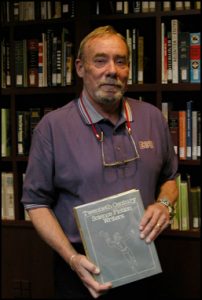Professor donates literature of the fantastic collection to Joyner library
GREENVILLE, NC — A recent donation to Joyner Library’s Special Collections at East Carolina University is both fantastic in size and subject.
ECU English professor Roger Schlobin recently donated 3,000 volumes of science fiction literature in honor of his parents and established the James and Virginia Schlobin Collection of Literature of the Fantastic.

Roger Schlobin
Schlobin, a Visiting Assistant Professor of English at East Carolina University and Professor Emeritus of Purdue University, said that while his father was an avid reader of the genre, it was his mother that was his inspiration for reading.
“My mother is the reason I read,” he said. “She was always reading, always pulling out a book.”
An author of seven books, Schlobin currently teaches science fiction writing and interpretive literature at ECU.
The collection was created to serve the needs of students and scholars of the supernatural genre that includes fantasy readings, science fiction, gothic and horror fiction.
Science fiction and horror novels mainly comprise the collection with works by Andre Norton, Michael Moorcock, Roger Zelazny, L. Sprague de Camp, Philip Jose Farmer and Charles de Lint.
The collection also includes literature for juvenile audiences and journals, including the Journal of the Fantastic in the Arts, Fantasy and Ariel.
The original gift was donated from Schlobin’s friends and relatives. ECU English professors Chip Sullivan and James Holte supplemented the collection with materials emphasizing vampires and Count Dracula. The collection is still undergoing cataloguing at Joyner Library.
The Special Collections Department is located on the fourth floor of Joyner Library. A major historical research facility, it contains a wide variety of archival, manuscript and published materials with a focus on the history of eastern North Carolina, East Carolina University and naval, military and maritime history subjects. The department provides an extensive repository for historical research materials and it ranks among the five largest such collections in North Carolina.